Jun 2014
Earliest pupping season on record for Seal Sitters
Jun/30/14 10:34 PM
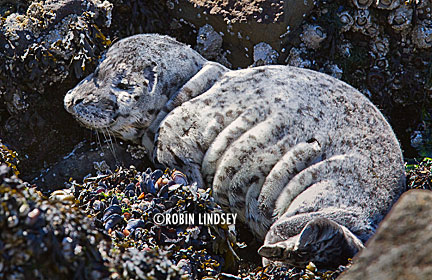
The hotline received a call mid-afternoon and first responders were quickly on the scene to discover a small, spotted pup nestled in the barnacle-encrusted rocks below the seawall. Volunteers established an extensive perimeter to reduce disturbance around the pup in hopes that the mom would return. The pup snoozed in the warm sun on a sparkling afternoon. Super-cool Seal Sitters volunteers Stella, age 8, and her sister Ruby, age 6, talked to curious kids and adults and informed them that the pup needed rest and quiet. The girls named the fluffy white pup Junebug. Also lending a hand to make sure Junebug stayed safe were new SS kid volunteers Savannah, age 8, and 3-year-old Juliette from Ballard.
Around 5:30pm, the incoming tide whipped the cold waters of Puget Sound over the pup and he swam along the shoreline looking for another place to come ashore. Volunteers followed his movements through binoculars and moved the perimeter when he finally came to rest. Junebug didn’t stay long, though, on the partially submerged, craggy rocks. Some onlookers thought they spotted another seal not too far offshore in the water, though the sighting was not confirmed by first responders. Volunteers scanned the nearby beaches but could not find the pup on shore. We’re hoping that Junebug was reunited with mom who is able to find a quiet and safe place to nurse him.
First responders will be out looking for Junebug at first light in the morning. If you see a pup on shore, please stay back and call our hotline @ 206-905-7325 (SEAL). If mom is frightened by people and dogs too close to her pup, she will likely abandon him.
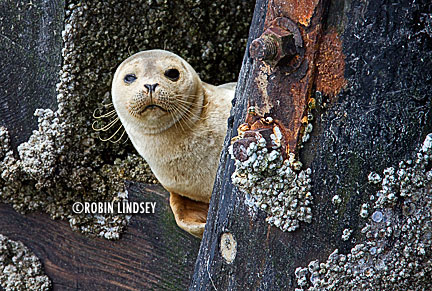
If you see a pup resting high above the water on a dock or pier, it’s important that you don’t scare him, causing potential injury in a fall. Additionally, It is much safer for him to rest on the timbers than on the beach with off-leash dogs.
PUPDATE (7/1/14 6:30am)
No sign of Junebug at dawn this morning.
Reward offered for brutal killing of seal on Washington Coast
Jun/28/14 05:22 AM
A $1,000 reward has been offered for information leading to the apprehension and conviction of the person(s) who intentionally and repeatedly ran over and killed a resting harbor seal on Washington’s outer coast.
On Wednesday morning at 11am, volunteers from the Westport Aquarium responded to a report of a live adult harbor seal on the beach near Grayland State Park. They posted high visibility signs around the ailing animal who exhibited symptoms of suspected protozoal encephalitis, a neurological disorder which is usually terminal. An assessment by a marine mammal biologist was imminent.
Sometime before 1pm, the seal was intentionally run over and brutally killed. WDFW Marine Mammal Investigations Unit led a necropsy on the adult female who had recently given birth (there was no sighting of her with a pup). The seal’s skull was smashed into numerous pieces and the brain was pulverized. The chest was also run over with 6 compound fractured ribs, lacerated lung, ruptured aorta and left atrium. The biologist confirms that she was likely run over at least two times.
State Parks Ranger Miles Wenzel gathered evidence at the scene for prosecution, taking photos and measurements of tire tracks in the sand, clearly visible on a path that ran across the seal’s head.
If you - or someone you know - were on the beach south of the Cranberry Road access (near Grayland Beach State Park in Grays Harbor County) on the afternoon of Wednesday, June 25, and have information to identify the person(s) or vehicle that killed this seal, please contact the Westport Aquarium at 360-268-7070. This case is being investigated by NOAA’s Office for Law Enforcement. Callers may remain anonymous. A $1000 reward has been offered.
This is the second intentional killing of an adult female harbor seal with a vehicle on the outer coast in less than two months. In early May, a nursing female was run over despite a clearly marked perimeter around her and her pup on Long Beach near Ocean Park. The seal’s tail was severed and she had to be euthanized. Her pup was never found. Please see related story here for more information.
ISN’T IT FINALLY TIME TO BAN VEHICLES FROM WASHINGTON BEACHES?
It has been legal to drive on Washington beaches for many years, dating back to a time when it was easier to navigate vehicles along the shoreline than through difficult coastal terrain. There has been a growing movement in recent years to ban driving on our State beaches (Oregon has rigid restrictions).
There are many concerns about the damage done by vehicles in sensitive coastal environments, damaging or destroying critical habitat and killing migrating shorebirds - not the least of which is the Pacific Coast population of the Western Snowy Plover, listed as threatened under the Endangered Species Act (vehicle access is restricted during nesting season in some areas).
Since 2004, there have been 6 reported pinnipeds run over and killed by vehicles on Washington beaches: 2 California sea lions and 4 harbor seals. On sunny weekends, accessible beaches turn into parking lots full of cars and trucks. Over the July 4th weekend a couple of years ago, a California sea lion pup and a harbor seal pup were killed. Year-round, young harbor seals and sea lions as well as adults need to rest on the shores of Washington’s outer coast (pupping season there is from mid-April through July). With limited funding and Marine Mammal Stranding Network volunteers, it is difficult to adequately protect them from harassment and harm.
It is time for Washington residents to speak out. Contact your State legislator and ask that ocean beaches be restricted from use by non-official vehicles and restored to their natural, peaceful state - and most importantly, be free from destructive erosion and the many dangers posed to wildlife who depend on this habitat for their survival. Certainly, these latest savage, very disturbing killings of the two harbor seals are a powerful and compelling argument in support of a vehicle ban.
On Wednesday morning at 11am, volunteers from the Westport Aquarium responded to a report of a live adult harbor seal on the beach near Grayland State Park. They posted high visibility signs around the ailing animal who exhibited symptoms of suspected protozoal encephalitis, a neurological disorder which is usually terminal. An assessment by a marine mammal biologist was imminent.
Sometime before 1pm, the seal was intentionally run over and brutally killed. WDFW Marine Mammal Investigations Unit led a necropsy on the adult female who had recently given birth (there was no sighting of her with a pup). The seal’s skull was smashed into numerous pieces and the brain was pulverized. The chest was also run over with 6 compound fractured ribs, lacerated lung, ruptured aorta and left atrium. The biologist confirms that she was likely run over at least two times.
State Parks Ranger Miles Wenzel gathered evidence at the scene for prosecution, taking photos and measurements of tire tracks in the sand, clearly visible on a path that ran across the seal’s head.
If you - or someone you know - were on the beach south of the Cranberry Road access (near Grayland Beach State Park in Grays Harbor County) on the afternoon of Wednesday, June 25, and have information to identify the person(s) or vehicle that killed this seal, please contact the Westport Aquarium at 360-268-7070. This case is being investigated by NOAA’s Office for Law Enforcement. Callers may remain anonymous. A $1000 reward has been offered.
This is the second intentional killing of an adult female harbor seal with a vehicle on the outer coast in less than two months. In early May, a nursing female was run over despite a clearly marked perimeter around her and her pup on Long Beach near Ocean Park. The seal’s tail was severed and she had to be euthanized. Her pup was never found. Please see related story here for more information.
ISN’T IT FINALLY TIME TO BAN VEHICLES FROM WASHINGTON BEACHES?
It has been legal to drive on Washington beaches for many years, dating back to a time when it was easier to navigate vehicles along the shoreline than through difficult coastal terrain. There has been a growing movement in recent years to ban driving on our State beaches (Oregon has rigid restrictions).
There are many concerns about the damage done by vehicles in sensitive coastal environments, damaging or destroying critical habitat and killing migrating shorebirds - not the least of which is the Pacific Coast population of the Western Snowy Plover, listed as threatened under the Endangered Species Act (vehicle access is restricted during nesting season in some areas).
Since 2004, there have been 6 reported pinnipeds run over and killed by vehicles on Washington beaches: 2 California sea lions and 4 harbor seals. On sunny weekends, accessible beaches turn into parking lots full of cars and trucks. Over the July 4th weekend a couple of years ago, a California sea lion pup and a harbor seal pup were killed. Year-round, young harbor seals and sea lions as well as adults need to rest on the shores of Washington’s outer coast (pupping season there is from mid-April through July). With limited funding and Marine Mammal Stranding Network volunteers, it is difficult to adequately protect them from harassment and harm.
It is time for Washington residents to speak out. Contact your State legislator and ask that ocean beaches be restricted from use by non-official vehicles and restored to their natural, peaceful state - and most importantly, be free from destructive erosion and the many dangers posed to wildlife who depend on this habitat for their survival. Certainly, these latest savage, very disturbing killings of the two harbor seals are a powerful and compelling argument in support of a vehicle ban.
Premature pup Ali dies in peace on protected beach
Jun/25/14 06:30 AM
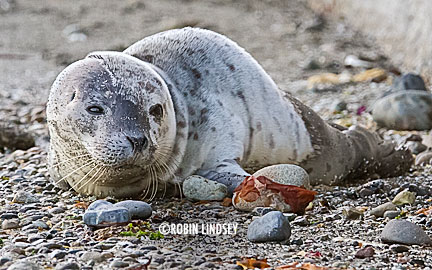
The premature pup originally sighted offshore on Friday, June 20th, worked his way a bit further south along the private stretch of Beach Drive and spent the past several days resting there under the watchful eye of neighbors and Seal Sitters first responders.
The thin pup died last evening. Abandoned by mom (circumstances unknown) and not meeting NOAA’s requirements for rehabilitation (read NOAA policy here), he was given the chance to rest and die in peace in on a quiet beach thanks to caring neighbors. Full-term seal pups have only a 50% chance of surviving their first year and survival rates of premature pups are greatly reduced in the wild. The beautiful little male pup, nicknamed Ali and a true fighter, was examined postmortem - photos of teeth will help our consulting marine mammal biologist estimate age.
Please check back for Seal Sitters' update as we receive more input from the biologist. Heartfelt thanks to everyone who so graciously allowed SS volunteers onto their property to observe and educate neighbors about this sweet little pup. It was a difficult and complicated situation for all involved.
Please contact Seal Sitters' hotline at 206-905-7325 (SEAL) if you have a marine mammal, dead or alive, on your beach.
Full-term harbor seal pups are just now being born in South Puget Sound area rookeries. View WDFW’s seal cam for a chance to see the pup born Monday evening, as well as lanugo pups at a protected harbor seal haulout. You might even get lucky and see a birth! By mid-July full-term pups will outnumber lanugos in the rookeries as seal pupping season will be in full swing in our area.
PUPDATE (June 26, 2014)
After review of photos, WDFW’s marine mammal biologist estimates that premature Ali was about a week old.
Another premature pup in West Seattle
Jun/21/14 07:43 AM
Yesterday morning, Seal Sitter’s first responders followed up on a report of a harbor seal pup in the water “calling” for mom. A homeowner on Beach Drive allowed us through private property to observe the pup just offshore from her home. The pup’s plaintive cry of “maaa-aaa-aa” had been heard since 2:30 am. Consultation with WDFW’s marine mammal biologist confirms that this pup would indeed be premature, as there have not been any recorded full-term births in the South Sound’s harbor seal rookeries - and none are expected till next week.
Since the pup was in the water, we could not assess the coat of the pup to determine how premature he/she might be. The hotline (206-905-7325) received no further reports during the day or evening regarding the pup. If this “preemie” comes ashore, please call our hotline immediately and keep a very low profile - we want to give this pup every chance to survive - and mom’s return is imperative to that goal. If the mom perceives danger from people or dogs, she may not return. If you have seen or heard the pup since yesterday morning, please give our hotline a call with an update as to the pup’s last whereabouts. If the pup is on your beach, please call us so that we may do a telephoto health assessment.
On June 9th, a month-premature lanugo pup nicknamed Luigi was born along Alki Beach. The mom never returned and, sadly, the pup had to be euthanized the following day.
Since the pup was in the water, we could not assess the coat of the pup to determine how premature he/she might be. The hotline (206-905-7325) received no further reports during the day or evening regarding the pup. If this “preemie” comes ashore, please call our hotline immediately and keep a very low profile - we want to give this pup every chance to survive - and mom’s return is imperative to that goal. If the mom perceives danger from people or dogs, she may not return. If you have seen or heard the pup since yesterday morning, please give our hotline a call with an update as to the pup’s last whereabouts. If the pup is on your beach, please call us so that we may do a telephoto health assessment.
On June 9th, a month-premature lanugo pup nicknamed Luigi was born along Alki Beach. The mom never returned and, sadly, the pup had to be euthanized the following day.
Volunteers gather mounds of trash from seemingly "clean" Alki
Jun/16/14 07:58 AM
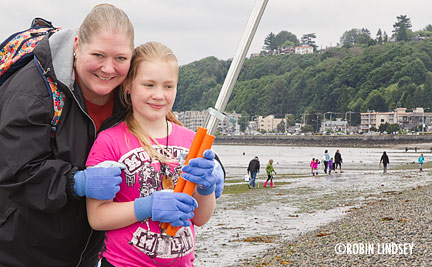
SS Lead Investigator Robin Lindsey and Amy Webster, PAWS Community Education Coordinator, gave a brief talk about the dangers of marine debris to wildlife. Since Friday was a dreary, rainy day with few beach-goers and Parks had done its usual early morning trash pickup, Alki Beach looked deceivingly void of trash. However, 73 volunteers (60 adults and 13 kids) fanned out over a wide area stretching from Constellation Park to Duwamish Head and sidewalks above, armed with gloves and long tweezers to pluck trash (photo shows PAWS Wildlife Rehabilitation Manager Emily Meredith with her daughter, as participants scour the beach in the background).
As volunteers returned to drop off their bags and buckets of trash, the pile grew by leaps and bounds - testimony that what appears to be a small amount of litter, indeed is very substantial. Among the inventory of intact and broken bottles, beer and soft drink cans, more than a thousand cigarette butts (which leech harmful chemicals into the water), plastic bottles, caps and lids was a dope pipe, a very disturbing 6 hypodermic needles (found in differing locations), a sizable blanket (large enough to potentially kill a gray whale if swallowed), auto tire, part of a boat, chains, piece
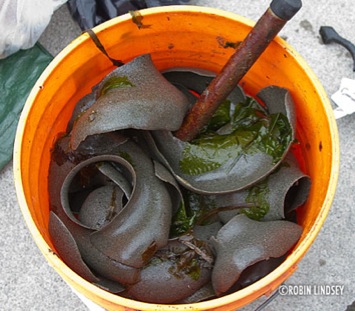
A number of volunteers also enthusiastically brought us what they thought to be plastic or rubber trash, but which were moon snail collars (photo right) - thin, circular casings of sand and mucous, each of which contains about 300,000 eggs. The collars were promptly returned to the beach. For information about moon snail collars, read Seal Sitters’ education advisor Buzz Shaw’s marine life blogpost.
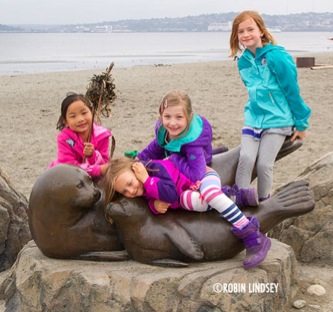
Seal Sitters thanks Seattle Parks for providing materials for the cleanup and our co-sponsor/partners PAWS Wildlife Center and Alki Community Council. We hope everyone will continue to pick up trash during their trips to the beaches - every day is beach cleanup day.
Heartbreak as premature seal pup born along Alki Beach
Jun/11/14 06:51 AM
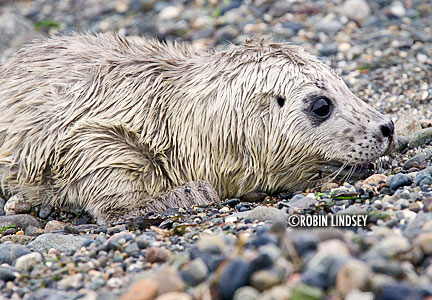
Within minutes, Seal Sitters first responder David and volunteer Eilene were on the scene attempting to establish a protective perimeter with tape and cones, asking people to please stand back. A man with a leashed dog illegally on the beach not only refused to leave the sand, but insisted that it was his right “as a taxpayer” to continue his path past the pup. Apparently, this taxpayer felt it was also his right to break municipal law by having his dog on a Seattle public beach - where dogs are not allowed leashed or unleashed. He finally left after an intense verbal exchange. Another dog owner was nearby throwing a ball into the Sound for his off-leash dog to fetch. We cannot stress enough that dogs are unpredictable and a documented danger to seal pups, causing injury and death to pups in Washington State each year. This was not a good start to our first response of the 2014 seal pupping season.
It was obvious that the surf-soaked pup was a newborn because of the bright flesh-colored umbilicus cord dangling from the pup’s belly. Her body was covered with a long, wavy white lanugo coat (photo above), an indication she was born a month prematurely. A full-term pup will shed this fluffy coat in the womb. We knew this was going to be a difficult situation for both the pup and Seal Sitters, who must try to keep this busy beach area quiet enough that mom might feel safe enough to return for her newborn, who could not survive without her.
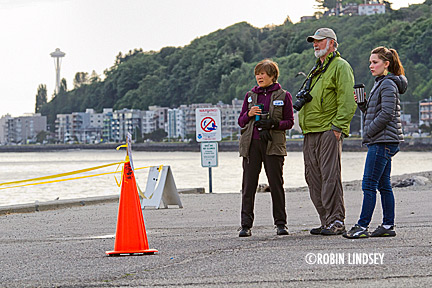
Seal Sitters volunteers tried to keep a low profile at the far ends of the yellow tape boundary, explaining to sympathetic and cooperative onlookers that this pup was believed to have been born that very day. Huge thanks to WDFW marine mammal biologist Dyanna Lambourn for her review of our photos and consultation as to pup’s age and condition.
The pup, nicknamed Luigi, was observed by volunteers throughout the day and discreetly during the dark of night and wee hours of the morning. It was crucial to know if an attending mom would return - no mom ever appeared to our knowledge. During the early morning hours the thin pup moved a bit further up the beach and at first light, the perimeter was adjusted to protect her in what was anticipated to be a warm, and therefore, very crowded day at Alki. Shown in the photo at sunrise with Seattle’s iconic Space Needle in the background are first responder Lynn, science and education advisor Buzz and new volunteer Savanna.
By early afternoon, it became increasingly likely that for unknown reasons, the pup was abandoned with no attending female who would care for this tiny pup. We have no idea what the circumstances surrounding the birth were. Was Luigi born on Alki and mom was scared back into the water by people or dogs before bonding with her pup? Did she give birth just offshore because the beach was busy, but the pup made it to shore alone? Did she die during the birth? If anyone witnessed an adult onshore or very close to shore, perhaps in distress, along Alki Beach Monday afternoon, please contact us. We do know that this pup was too tiny and weak to have swum any substantial distance after birth.
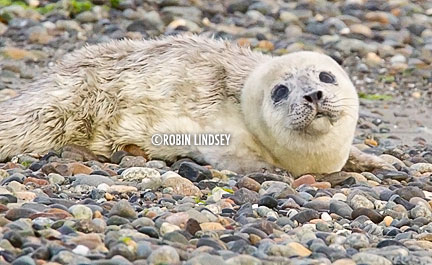
Premature pups - especially one born a month early - rarely survive the lengthy rehab process. If they manage to stabilize for the short term, too often it is only to die shortly after. Nature can be harsh. About 90% of lanugo pups born in the wild don’t survive - and most of those are partial lanugos, not a full month premature. Lanugos require much more maternal care than a full-term pup and some less experienced moms will make the decision to abandon a premature pup whose lungs and muscles may not be fully developed, plus any other factors that may have contributed to an early birth. Even full-term, healthy wild-weaned pups have just a 50% chance of surviving their first year. If a full lanugo pup did manage to make it through rehabilitation and was released, those already daunting odds become even greater against survival in the wild - never having been taught by mom to forage in the expansive waters of Puget Sound. A premature pup’s (for that matter, all pups) best chance is always with mom.
While waiting for authority to transport Luigi for health assessment and as the sun heated up, the pup worked her way down to the water’s edge to thermoregulate and cool down her body temperature. As a crowd of adults and children cried out anxiously, Luigi was swept up in the surf, rolling over and over without the strength to keep from drowning. SS lead investigator Robin donned protective exam gloves (like most animals, seals can transmit disease) and rescued the pup, too weak to swim, from the swirling waves.
Luigi was moved higher up on the sandy beach and we placed an urgent call requesting approval for assessment. That wish was granted and the pup was placed in a kennel and driven to PAWS Wildlife Center in Lynnwood, the only rehab facility in South Puget Sound. Only members of NOAA’s Marine Mammal Stranding Network are authorized to handle and transport marine mammals. It is illegal for the public to touch, feed, move or harass marine mammals.
Sadly, on intake at PAWS, it was determined that sweet Luigi, a female weighing only 5.5 kg (12 lbs, 2 oz) and measuring 70 cm (27.6 in), needed to be humanely euthanized. She was the youngest pup PAWS was known to have received. We thank PAWS for their kindness. We thank, too, our many volunteers who gave Luigi the best chance possible to survive and enabled her to rest quietly on West Seattle’s shore. Luigi gave us all great joy - and educated many people about this special species that is so dear to Seal Sitters MMSN’s heart. On this sad note, we also extend our thanks to the caring public who showed such warmth to our volunteers and to this little seal pup.
"Sentinels of the Sound" beach cleanup June 14th
Jun/10/14 07:01 AM
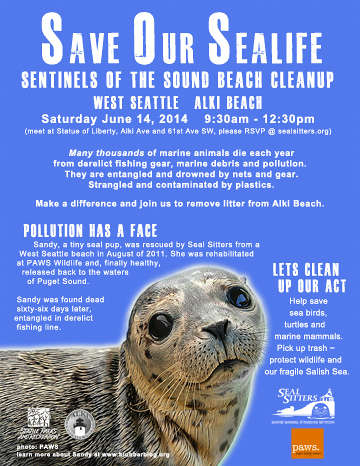
Please RSVP.
Prior to dispersing volunteers with materials to pick up trash, Seal Sitters and PAWS Wildlife Center will speak briefly at 9:30 about the dangers of marine debris to wildlife and the difficult rehab of harbor seal pups.
All marine life is endangered by marine debris and pollution. Many, many thousands of marine animals and sea birds die each year from derelict fishing gear, marine debris and pollution. They are entangled and drowned by nets and gear. Strangled and contaminated by plastics. Sea birds choke on plastic and limbs are severed.
This year's beach cleanup events will once again be in honor of seal pup Sandy who was rescued from a West Seattle beach in August of 2011, rehabilitated at PAWS Wildlife Center, and then released back to the wild in January of 2012. Sandy was found dead 66 days later, entangled in derelict fishing gear. The event is also in honor of the juvenile gray whale that died on Arroyos beach in April of 2010. The necropsy revealed only human trash in the whale’s stomach.
Please join us to help save marine life! For more info and to RSVP, please click here.
La Jolla harbor seal colony can use your help
Jun/08/14 09:59 AM
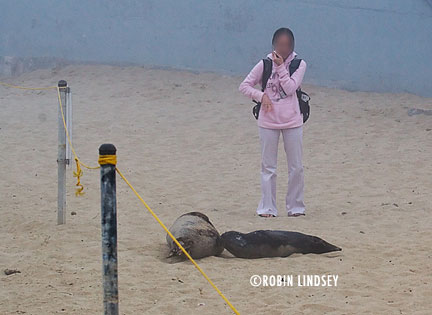
Recently, in a huge win for the seals, the San Diego City Council voted 6 to 3 in favor of annual seasonal closure of Casa Beach during Southern California’s harbor seal pupping season, from December 15th-May 15. This closure will deny the public access down onto the small beach during this time, as the beach stairs will be chained off at the middle landing. There will still be perfect viewing for the public from the stair landing, sidewalk above and the seawall.
Following pupping season, a rope barrier will be placed on the beach to provide some form of protection for the colony, but the beach will be legally open for use during the summer and fall months through a gap in the rope. In the photo above, a nursing mom has gone under the rope into the public zone on the small beach - evidence of the importance of preventing public access down onto the beach during pupping season in particular, while moms and pups are vulnerable to disturbance.
The controversy over the right for harbor seals to use this urban beach to rest, give birth and nurse their young has been going on for decades (see Seal Sitters dedicated webpage about Casa Beach). Some anti-seal protesters regularly harass and flush the seals from the beach, putting newborn and weaned pups in grave danger - insistent that the beach belongs to people, not seals - even though there are a number of nearby easy-access beaches for use by divers and swimmers.
This victory to close the beach steps is only a temporary step. The seasonal closure of the beach still needs to be approved by the California Coastal Commission. Approval must be granted by August to ensure access will be restricted during the coming winter/spring pupping season (for pupping seasons in Washington State, click here).
Please write a letter to the Coastal Commission requesting permanent annual seasonal closure of Casa Beach (also known as Children’s Beach) in La Jolla. A sample letter suggested by Seal Conservancy of San Diego (formerly La Jolla Friends of the Seals) is provided here. Please embellish with your personal thoughts about the need to Share the Shore with wildlife - and to grant this small sanctuary for marine mammals in La Jolla, while providing an unparalleled educational experience with an unobstructed view from above the beach. Seal Sitters MMSN would argue that the stair chain remain year-round to ensure the seal colony is not harassed and put in danger. However, having the steps chained during pupping season is a major victory for seal advocates in a decades-long battle. Even with the rope in place on the beach during the remainder of the season, a curious public is allowed to stand far too close to resting seals. All marine mammals are protected from harassment by the Marine Mammal Protection Act.
The harbor seals of Casa Beach need us to be their advocates! Please write the California Coastal Commission before August in order to be considered as testimony. For the latest news on this issue and a link to thank the 6 members of the San Diego City Council who supported the seals, visit the SCSD website.
Author Brenda Peterson to read from Leopard and Silkie
Jun/05/14 07:07 PM
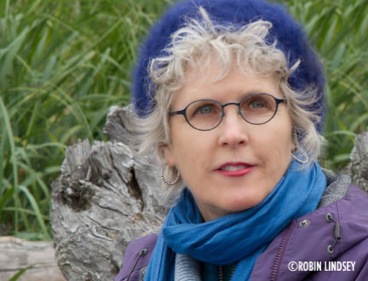
On Friday, June 6th, from 5-7pm at the West Seattle Barnes and Noble (map it here), Brenda will be reading from the following recent works:
Leopard and Silkie: One Boy's Quest to Save the Seal Pups is the true story of two harbor seal pups who befriended each other on the shore of West Seattle. Woven into the storyline is young Seal Sitter Miles whose mission is to protect “Leopard”. The book is illustrated by photographer Robin Lindsey, co-founder and Lead Investigator of Seal Sitters. Read More...







